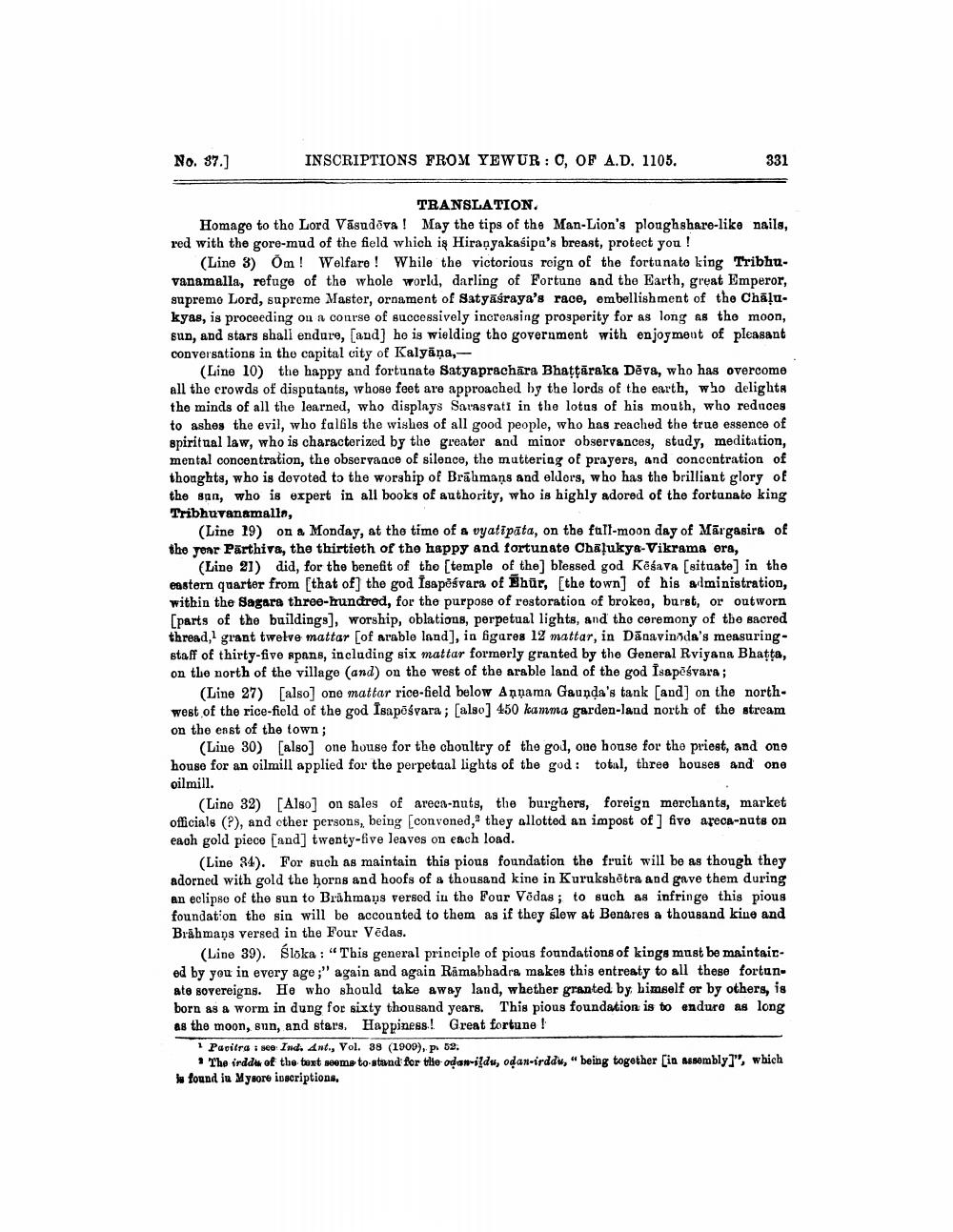________________
No. 37.]
INSCRIPTIONS FROM YEWUR: 0, OF A.D. 1105.
331
TRANSLATION. Homage to the Lord Visudova ! May the tips of the Man-Lion's ploughsharo-like nails, red with the gore-mud of the field which is Hiranyakasipa's breast, protect you !
(Line 3) Om! Welfare! While the victorious reign of the fortunate king Tribhuvanamalla, refuge of the whole world, darling of Fortune and the Earth, great Emperor, supremo Lord, supreme Master, ornament of Satyaśraya's race, embellishment of the Chāļu. kyas, is proceeding on a course of successively increasing prosperity for as long as the moon, sun, and stars shall endure, [and] he is wielding the government with enjoyment of pleasant conversations in the capital city of Kalyāņa,
(Line 10) the happy and fortunate Satyaprachāra Bhattāraka Dēva, who has overcome all the crowds of disputants, whose feet are approached by the lords of the earth, who delights the minds of all the learned, who displays Sarasvati in the lotus of his mouth, who reduces to ashes the evil, who falbis the wishes of all good people, who has reached the true essence of spiritual law, who is characterized by the greater and minor observances, study, meditation, mental concentration, the observance of silence, the muttering of prayers, and concentration of thoughts, who is devoted to the worship of Brāhmaṇs and elders, who has the brilliant glory of the son, who is expert in all books of authority, who is highly adored of the fortunate king Tribhuvanamalla,
(Line 19) on a Monday, at the time of a vyatīpāta, on the fall-moon day of Mārgasira of the year Pārthiva, the thirtieth of the happy and fortunate Chāļukya-Vikrama era,
(Line 21) did, for the benefit of the temple of the) blessed god Kagava (situate) in the eastern quarter from [that of] the god Isapośvara of Bhūr, [the town] of his alministration, within the Sagara three-hundred, for the purpose of restoration of broken, burst, or outworn [parts of the buildings), worship, oblations, perpetual lights, and the ceremony of the sacred thread, grant twelve mattar [of arable land], in figures 12 mattar, in Dānavinoda's measuringstaff of thirty-five spans, including six mattar formerly granted by the General Rviyana Bhatta, on the north of the village (and) on the west of the arable land of the god Isapēśvara;
(Line 27) [also) ono mattar rice-field below Annama Gaunda's tank (and) on the northwest of the rice field of the god Isapośvara; (also] 450 kamma garden-land north of the stream on the east of the town;
(Line 30) [also] one house for the choultry of the god, one house for the priest, and one house for an oilmill applied for the perpetaal lights of the god : total, three houses and one oilmill.
(Line 32) [Also on sales of areca-nuts, the burghers, foreign merchants, market officials (?), and other persons, being convened, they allotted an impost of ] five areca-nuts on each gold piece [and] twenty-five leaves on each load.
(Line 34). For such as maintain this pious foundation the fruit will be as though they adorned with gold the horns and hoofs of a thousand kine in Kurukshetra and gave them during an eclipse of the sun to Brühmaus versed in the Four Vēdas; to such as infringe this pious foundation the sin will be accounted to them as if they slew at Benares a thousand kine and Brahmans versed in the Four Vēdas.
(Line 39). śloka : "This general principle of pious foundations of kings must be maintaiced by you in every age;" again and again Ramabhadra makes this entreaty to all these fortunate sovereigns. He who should take away land, whether granted by himself or by others, is born as a worm in dung for sixty thousand years. This pious foundation is to endure as long as the moon, bun, and stars, Happiness! Great fortune!
1 Pavitra : see Indi Ant., Vol. 38 (1900), p. 62.
• The irdata of the text seeme to stand for the odaw-iędu, odan-irddw," being together [in Assembly]", which is found in Mysore inscriptions,




